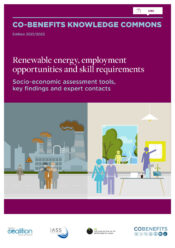 Renewable energy technologies are job boosters: in 2020, the renewable energy sector employed at least 12 million people around the globe. Many governments worldwide have recognized that the energy pathway they choose will not only have an impact on combatting global warming and meeting climate goals, but also define the basis for their countries’ future development. Renewables can create sustainable jobs and improve the gender balance in the future energy sector.
Renewable energy technologies are job boosters: in 2020, the renewable energy sector employed at least 12 million people around the globe. Many governments worldwide have recognized that the energy pathway they choose will not only have an impact on combatting global warming and meeting climate goals, but also define the basis for their countries’ future development. Renewables can create sustainable jobs and improve the gender balance in the future energy sector.
To harness the full potential of the social and economic co-benefits of renewables and to build the skills base needed for the energy transition, decisionmakers depend on reliable data.
With this factsheet series, we seek to present the state of the art in assessing employment co-benefits, interconnecting climate friendly power planning and sustainable job creation. This joint factsheet edition connects policymakers in local and national government agencies with expert organisations and contact persons, to quantify specific employment co-benefits, assess policy options and unlock potentials for people and communities.
Year of publication: 2021
Published by the COBENEFITS project in collaboration with the Sustainable Energy Jobs Working Group under IRENA’s Coalition for Action
Edited by Franziska Sperfeld, Sarah Kovac, Sophie Dolinga, Laura Nagel, Héctor Rodríguez – UfU and IASS